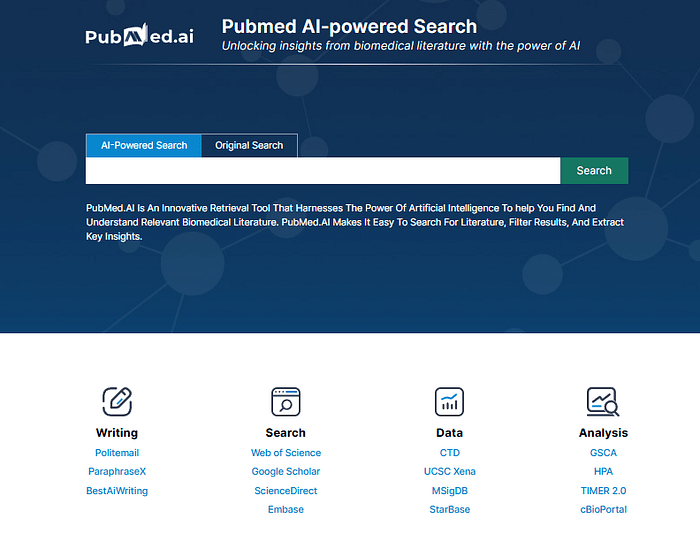Harry Blackwood, A Researcher
By Connor Wood @ 2025-04-18T03:05 (–7)
As a bioinformatics researcher just starting my PhD journey, I’ve been thinking a lot about how AI fits into learning to code, managing lab life, and navigating our broader social environment. In this post, I’ll share my experiences using AI tools to bridge skills gaps, balance hands‑on training with digital assistance, and stay connected with colleagues without losing sight of real‑world context. I’m writing this to spark a conversation — feel free to share your own perspectives.
Meet Pubmed.ai

While experimenting with various AI tools, I saw how time‑consuming literature searches can be. To streamline this, I teamed up with classmates to build Pubmed.ai, a simple web app that:
- Fetches the latest PubMed abstracts matching your keywords
- Summarizes key findings in one or two sentences
- Highlights methods and results sections for quick scanning
Using Pubmed.ai in my own workflow cut down my reading time by about half and helped me stay up to date without drowning in articles. It’s now free for any researcher to try — feedback and feature requests are welcome!
Finding My Feet in Bioinformatics. When I first switched from neuroscience to bioinformatics, coding felt like learning a new language. I had statistics down, but writing R scripts and handling large datasets was another story. AI tools became my go‑to when I hit roadblocks — whether it was debugging a stubborn loop or understanding how a package function worked. Instead of flipping through a textbook for hours, I could get a quick example, try it out, and learn by tweaking.
Yet, I make it a point to write code by hand first and then ask AI for suggestions. That way, I’m not just copying solutions; I’m training myself to think through each line. This back‑and‑forth helps me internalize patterns and build confidence that goes beyond autocomplete.
Life in the Lab and Beyond
Late nights in the lab are part of the routine. Between pipetting experiments and monitoring servers, it’s easy to feel isolated. I’ve found that building small rituals — like a mid‑day stretch break or a quick walk around campus — keeps me grounded. When I’m back at my desk, I’ll often jot questions into my notes app and revisit them later with AI’s help.
On Fridays, a few of us grab lunch together. These informal chats range from sharing coding tips to debating the latest developments in computational biology. It’s a reminder that science is a social enterprise — ideas grow when we talk them through face to face, not just behind a screen.
Work, Collaboration, and AI
https://www.youtube.com/watch?v=i1UJSFirEKc&t=5s
Our team spans diverse backgrounds: statisticians, molecular biologists, software engineers. AI can help bridge those gaps by translating code snippets into plain‑English explanations or summarizing key points from a protocol. But I also value human feedback — pair programming sessions or code reviews with a colleague often uncover insights that AI misses.
I see AI as a collaborator rather than a replacement. It speeds up routine tasks and frees me to focus on bigger questions, like designing better algorithms or interpreting results. The key is knowing when to trust the machine and when to step back and apply our own judgment.
Society and the Bigger Picture
Outside the lab, there’s a buzz around AI’s impact on healthcare, data privacy, and job markets. I try to stay informed but avoid getting overwhelmed by headlines. Instead, I focus on ethical questions in my own work: How do we ensure patient data stays secure? Are we building models that serve diverse populations? These considerations keep me connected to the real people behind the data.
At the same time, I’m excited about AI’s potential to democratize learning — students anywhere can access tutorials, share code, and get feedback instantly. It’s up to us as researchers to shape these tools responsibly and make sure they uplift everyone, not just the few.
Let’s Discuss
I’m keen to hear how others are integrating AI into their bioinformatics training and daily workflow. Have you found tricks for staying engaged with core concepts? What habits help you balance screen time with hands‑on practice? Drop a comment or reach out — this is just the start of the conversation.